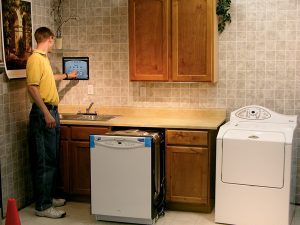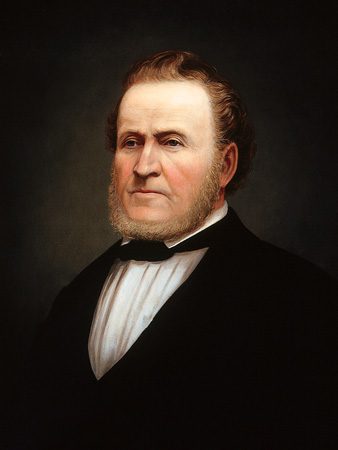In today’s user-friendly world, hardware and software solutions to everyday problems rise to the throne and are deposed faster than you can say “Pentium processor.” At the Direct Control Exhibition on April 15, a team of BYU students and professors revealed the future monarch of home computing technology—the SmarterHome. Within two to three years, consumers will be able to control a variety of home systems and appliances, including the washer, dryer, utilities, and sprinkler and security systems—all through one computer.
Funded by the Utah State Centers of Excellence, BYU’s Versatile Machine and Actuator Control (VMAC) team has been developing direct control technology since 1998. VMAC technology allows users to control all home devices through a simple, easy-to-use touch-screen monitor, located anywhere a user desires and an Ethernet cable can reach, such as a kitchen or bedroom.
“You don’t have to remember how to program the lawn sprinklers or go find the controller. They’re already there on your really handy interface,” says Michael S. Baxter, ’01, a graduate student double majoring in mechanical engineering and business administration who has spent the last two years leading the VMAC team. At the exhibition, demonstrators showed that not only is the technology convenient—a washing machine can be programmed to wash a shirt for just three minutes instead of running a standard, preset cycle—but it’s affordable. Whereas some advanced integrated control systems run close to six figures, putting them out of the range of many home owners, the SmarterHome system will cost between $4,000 and $5,000, about the price of a home’s appliances. “We think that once it is fully integrated, it will actually be cheaper than the accumulation of the stand-alone devices we have now,” says W. Edward Red, professor of mechanical engineering. “We think the integrated home will be a cheaper home.”

Graduate student Michael Baxter, leader of the VMAC team for two years, sets up a display of the direct control technology developed by a team of mechanical engineers to make controlling home appliances more convenient and efficient. Photo courtesy Edward Red.
In addition, the Internet-controlled units can be accessed anywhere—through a desktop computer, a PDA, or other device. Using a cell phone, a homeowner can activate an alarm system or even turn on the lights while away. And because the technology is Internet based, appliance upgrades would be available through individual company Web sites. “The average consumer will benefit simply because the use of the home will be uniform, easier to use, more energy efficient, and frankly, you’ll have whole-home control from any place in the world,” says Red.
Now that the technology has been unveiled, the team plans to begin putting together a consortium of manufacturers to produce VMAC-compatible appliances. This includes companies dealing with security systems, sprinkler systems, home appliances, and heating and cooling systems. Once a consortium is in place, home buyers will have the option of having The SmarterHome system in their new home.
“Our proposal, what we call the grand experiment, is to provide a new housing development that offers the first SmarterHomes in the country,” says Red. “That’s our glorious vision.”









